Monthly archive for September 2015
Showing results 1 - 5 of 8 for the month of September, 2015.
29 Sep 2015
I was recently travelling to Ungersheim in France to give a talk, a journey that involved passing through several train stations. On the journey I had been reading Michael Shuman’s fantastic new book ‘The Local Economy Solution‘ (highly recommended). In it, he paints a rigorous and passionate case for economic localisation, and in particular what he calls “pollinator” enterprises.
A pollinator enterprise is self-financing, and its role is to weave the local economy back together again, to bring about a different local economic model than the current one of throwing open local markets to big companies, focusing instead on growing the local sector. In many ways it’s a model that sounds like what REconomy is doing, that combination of Local Economic Blueprints, Local Entrepreneur Forums, business mentoring and support, crowdfunding, local currencies and so on. It certainly feels very affirmingly familiar, so far, but I’m only on page 57 so I don’t know where he may yet take it.
I arrived at Paris Gare de l’Est with Shuman’s ideas going round and round in my head, and feeling like I quite fancied, in the 50 minutes before my train, sitting down and having a cup of tea. Gare de l’Est is a big station, but while there were several places you could grab a panini and eat it standing up (all chains so far as I could see), there were only two places where you could actually sit down and have a drink. One was a very large Starbucks, whose seating area took up a meaningful chunk of the concourse. The other was much smaller. And it was also a Starbucks. Two Starbucks, one large, one small, within a stroppily-hurled coffee cup’s distance of each other. That was it.
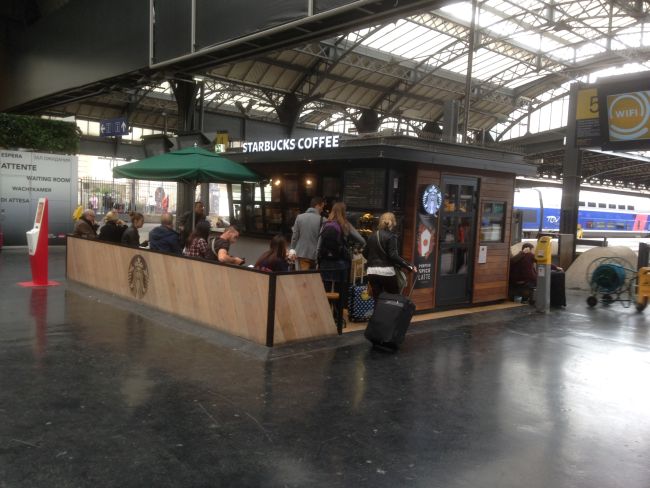
I’ve written before about the potentially powerful role that train stations could play as pollinators. With so many people passing through them, they have huge potential to incubate new enterprises, to showcase local food, local dishes, local entrepreneurs. Clearly someone in the management at Gare de l’Est has taken the decision that Starbucks can pay the most rent so let them have the space. But what if they had taken a different approach and had several smaller outlets? If in unused space at the station they had created a La Cocina-style incubator for new food businesses, and featured them on the station? What if stations (and now we’re on the subject, other public spaces like schools and hospitals) were required, when deciding how to lease their space, to maximise social return, a cultural return, the Multiplier Effect, and also a public health return? How might that nudge their thinking, and what we might end up with instead?
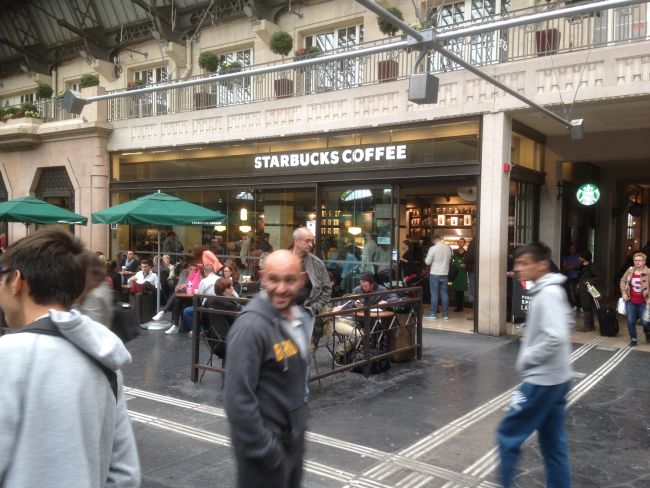
It was recently reported that WH Smith had been found out for charging up to 90% more for goods sold in their shops situated in hospitals than on the High Street, outrageous practice I grant you. A survey in Leeds, for example, found them to be charging £1.89 for a 750ml bottle of water in the hospital, but just £1 in a city centre shop. But in all the coverage no-one asked why it was that in many hospitals your self-catering choices are a WH Smith and a Costa, neither renowned for their commitments to local produce or especially healthy fare, both extractive industries. Hospitals as pollinators? Is that really such a leap from their current public health remit?
In that previous blog, I mentioned the rather fine craft brewery bar on Sheffield station, and I recently visited the new Kings Cross station and was impressed by the number of small, independent food businesses. The station at Crystal Palace station features a great independent cafe serving local produce. There are undoubtedly more. But the general trend is for them all to be the same dull names: Pret; Costa; Starbucks; Pumpkin; Scoff; Trough; Yawn; Bore (OK, I may have made a few of those up, but you get the point). Gare de l’Est sits in a part of Paris with a high immigrant community, many of whom are trying to gain an economic foothold in the city, to start their own businesses. Paris is a city of great food, of regional dishes, of urban agriculture pioneers, and of a rich tapestry of different cultures and their distinct cuisines. It’s a city that historically sat at the centre of complex, largely localised food webs. But arrive at Gare de l’Est station and you’d be none the wiser that that was the case.
At the recent International Permaculture Conference I heard again and again the old permaculture maxim that ‘the Problem is the Solution’. Never are the words more apt than in thinking about Gare de l’Est station. The solution to some of the problems faced in the area, and the role the station could play in addressing them, is blindingly obvious (to me at least).
In the Transition future world of 2025, I imagine walking into Gare de l’Est, and being greeted by delicious food smells. Walking down the concourse, I am spoilt for choice. There is a wide variety of beautifully presented food, made with mostly local ingredients but with recipes from around the world. My attention is drawn to the Food Entrepreneurs’ School in rooms above the station, training local young people in a range of food-based skills. The station owners have themselves invested in many of the best entrepreneurs who have come through the School. It’s a station where bread is baked, beer is brewed, falafels are fried, naans are stuffed and spices are ground.
And then take that and spread it out across the world, station by station. How much more fascinating, rich and delicious would travel become? How much more vibrant would each local economy become? We would be so proud of our stations. They would be how we would show off to visitors how much more interesting we are than we used to be. Pollinator stations, your time has come. But not the airports, we hopefully won’t be needing them much by then. They’ll have been turned into great urban farms: Terminal One Fungi, Terminal 3 Carp and so on. To quote, as I often do, Elliot Murphy from his sleeve notes for ‘1969: Velvet Underground live’, “I wish it were a hundred years from today (I can’t stand the suspense).”
Read more»
28 Sep 2015
I am often asked the question what it might look like if a local government really took Transition by the horns, initiated it, and acted as the catalyst for the community to start a meaningful and impactful Transition process. Having visited Ungersheim in the Alsace region of eastern France, I can now tell you exactly what it looks like.
I was invited by Ungersheim’s remarkable Mayor, Jean-Claude Mensch and the Comune d’Ungersheim to speak at their ‘Les rencontres de la Transition’ event (“meetings of Transition”) and to see what they have been doing there. Several years ago, Mensch hosted a visit by an organisation called the General Assembly of the Citizens of the World, at which the film ‘In Transition 1.0’ was screened. It led to a conversation in the Comune along the lines of “we’re already doing that, let’s become a Transition town”. And so they did.
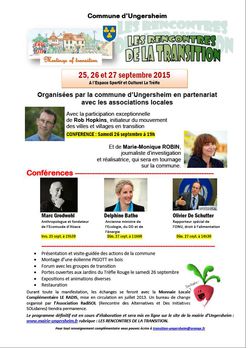 They are the first Transition initiative I know of to be launched by a local authority in this way. Ungersheim is a village with a population of around 2,000, and is a place with a long history of mining. At its peak, the extraction of potasse, used to make potassium for agricultural use and to made sodium chloride (salt) for treating ice on roads, employed 13,000 people in the region. The last mine closed in 2003. In France, Mayors have a lot more power than they do in other parts of the world, so it is fascinating to see just what can be achieved when a Mayor is inspired by Transition. Here are some of the things that have already been done in Ungersheim. The village has:
They are the first Transition initiative I know of to be launched by a local authority in this way. Ungersheim is a village with a population of around 2,000, and is a place with a long history of mining. At its peak, the extraction of potasse, used to make potassium for agricultural use and to made sodium chloride (salt) for treating ice on roads, employed 13,000 people in the region. The last mine closed in 2003. In France, Mayors have a lot more power than they do in other parts of the world, so it is fascinating to see just what can be achieved when a Mayor is inspired by Transition. Here are some of the things that have already been done in Ungersheim. The village has:
- Introduced more participative democracy
- Become a Fair Trade town
- Formed a citizens forum about renewable energy and campaigned for the closure of the Fessenheim nuclear power station
- Launched a local currency, ‘Le Radis’ (the radish)
- Mapped the biodiversity of the area in an ‘Atlas of Biodiversity’
- Returned a former waste heap created by mining to nature
- Installed a 120m2 solar thermal installation at the swimming pool
- Installed a wood biomass boiler which also heats the pool and several adjoining buildings
- Built Helio Parc 68 (of which more later), a 5.3MW solar installation and industrial estate
- Changed all the public lighting in the village to low energy bulbs, leading to a 40% reduction in energy use, as well as turning some street lights off after midnight
- Assessed all public buildings for their energy consumption
- Made land available (land owned by the Comune) to a PassivHaus co-housing project, Eco-Hameau Le Champré (of which more below)
- Completely banned all pesticides and herbicides in public areas
- Replaced all cleaning products in public buildings with eco cleaning products
- Bought a working horse to help with local food production, and also to act as a ‘bus’ to take local school kids to school
- Changed the catering arrangements so that the local primary school now serves 100% organic meals, every day, including snacks
- Transformed 8 hectares of land owned by the Comune into an organic market, Les Jardins de Cocagne, which produce 64 varieties of vegetables, provide 250 baskets of food for local families each week, and which run stalls at 5 markets every week
- Started a food preservation business, canning locally produced food so as to extend its availability
It’s a story that has attracted national and international attention, indeed while I was there, the film-maker Marie-Monique Robin was filming for a documentary about Ungersheim, due out next year. I also heard of at least 6 new Transition initiatives that have formed in towns and villages around Ungersheim, inspired by what is happening there. It’s quite something.
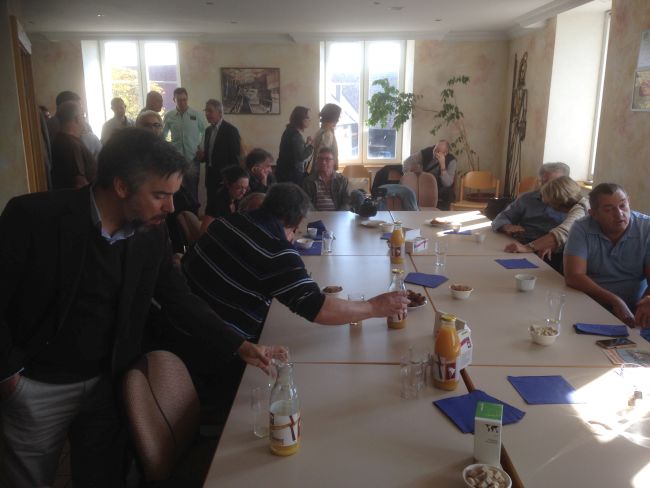
Our day started at the Mayor’s office in the centre of the village with about 30 people. We saw a film introducing the work underway there, and heard a short welcome from Mr Mensch. Here it is, it gives a great overview (in French though, of course):
Over a shared organic and Fair Trade breakfast we talked and people asked questions. Then we were into a horse-powered carriage, and off to visit a fantastic co-housing project. The Comune had made the land available at a realistic price on the understanding that the houses that were built would be PassivHaus buildings.
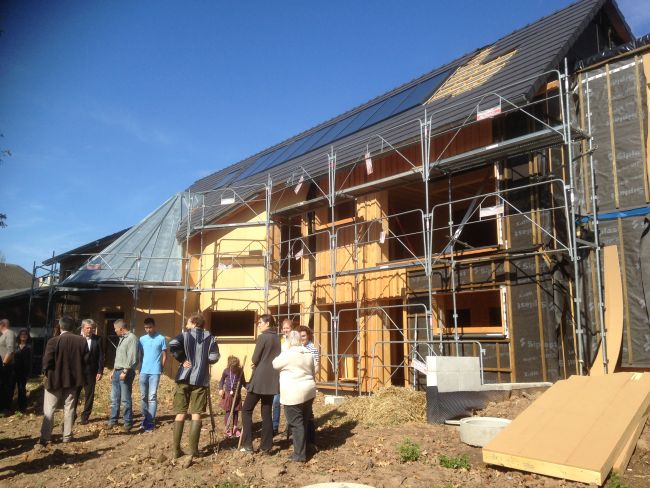
The resultant co-housing project is built using local timber, and will be home to 9 families. Each family have created their own process, finding their own balance between professional builders and self-built. Houses are south-facing, timber-framed, made with ModCell-type pre-manufactured strawbale panels, with a communal solar hot water scheme and shared gardens. Insulation is with straw, wood fibre boards, blown cellulose and one I hadn’t seen before, “wood wool”.

We saw round some of the houses under construction and met some of the residents, as well as the architect, who described it as his “dream project”. Then we were into the horse-drawn carriage and back to the centre of town, to a large marquee that had been erected in the centre of the town, for a communal lunch.
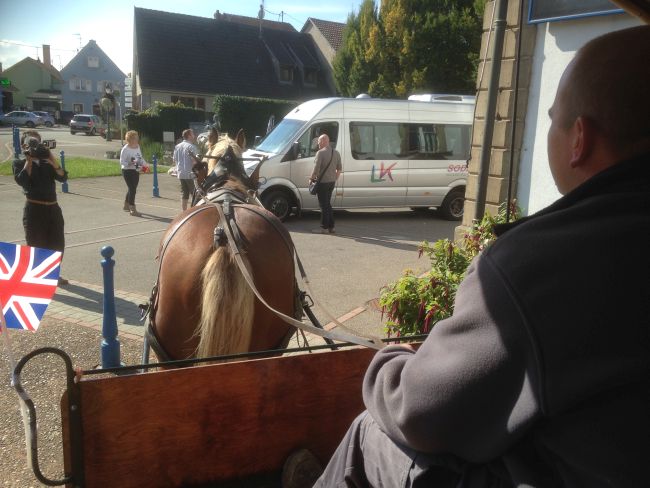
Our next trip was to the official opening of Helio Parc 68, a 5.3MW solar farm. The site was a former waste site associated with the mining, which had been cleared and levelled and transformed into what will become a business park, with the thousands of solar panels, the biggest single solar installation in the Alsace, mounted on structures that could, as some already have, been fitted out as industrial units.
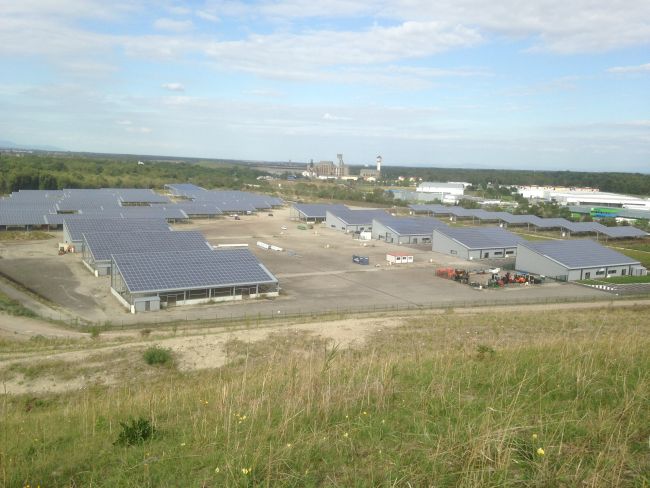
A large crowd had gathered, including local dignitaries. Having never inaugurated anything in my life before, this was the first of three inaugurations that day! Along with someone representing the developers, we unfurled a banner launching the scheme, and then I switched on one part of the installation. Remarkably ambitious, and of a scale that I’ve not personally seen before. Here’s a piece that appeared in the following day’s regional newspaper:
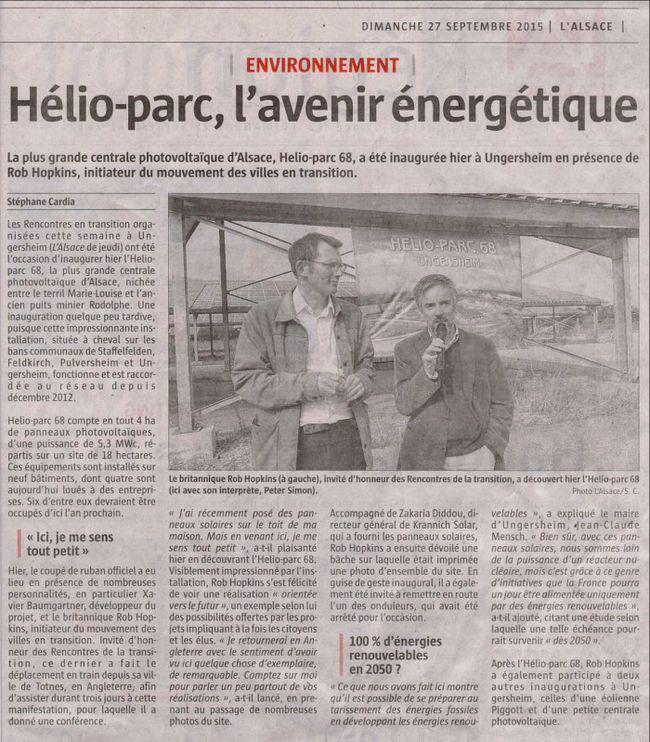
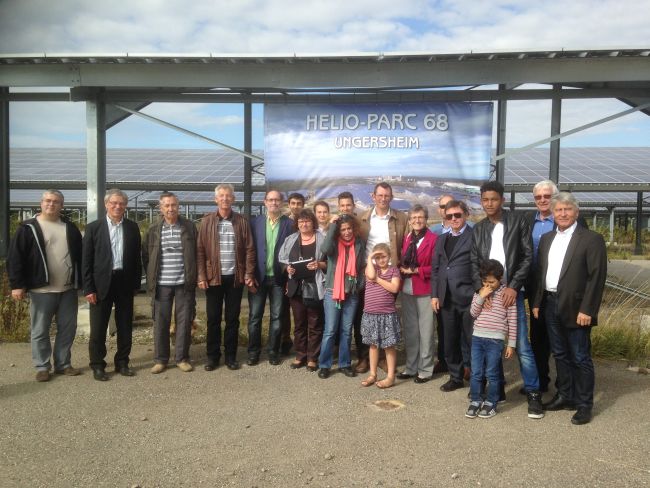
Our next stop, and my second inauguration, was at Les Jardins de Cocagne, an 8 hectare market garden which acts as a training and support resource for unemployed young people. Here, for weeks before, a team including local school children had been building a wind turbine with wooden blades, inspired by the work of Hugh Piggott. Again, a large crowd had gathered, and after a short speech from the Mayor, I flicked the switch to allow the turbine to be hydraulically lifted into place, to much applause and cheering. Once it had all been bolted in place, it began to spin, much to everyone’s delight.
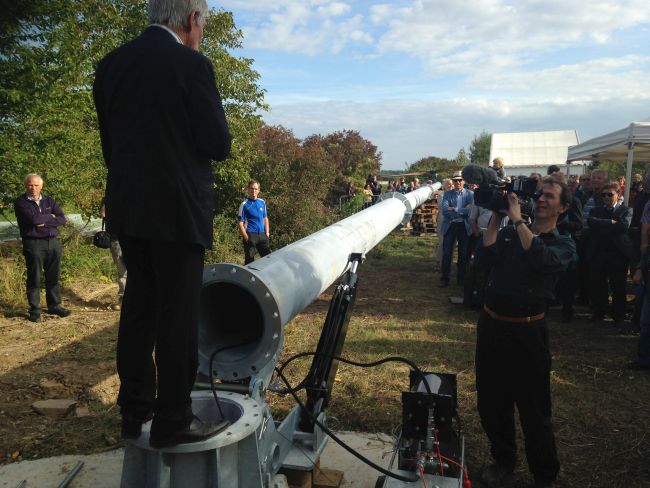
We also looked round an absolutely gorgeous new complex of buildings that will become a place for the market garden to process its produce, to store it in a new underground cool room, to can and preserve produce as well as to have its office. We looked round with the architect. An absolutely gorgeous structure that I would move into tomorrow at the drop of a hat, it featured a local timber frame, wooden shingles on the roof (always a treat for the eyes), strawbale infill and it will be finished with a clay and straw daub coat. The complex of buildings are created around a circular courtyard, what will be an absolutely delightful space. I can’t wait to see it finished.
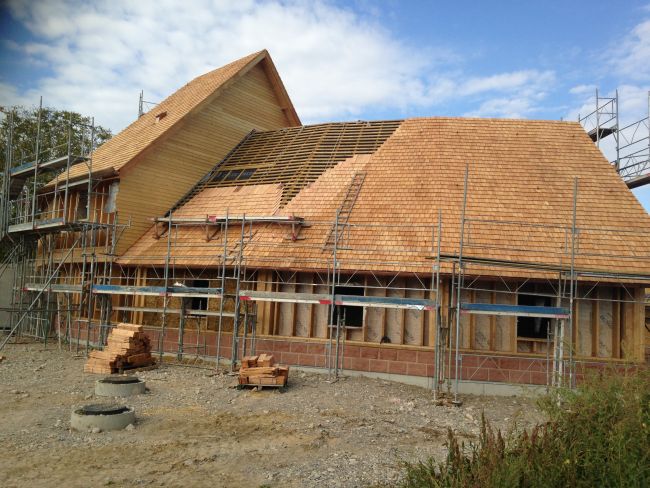
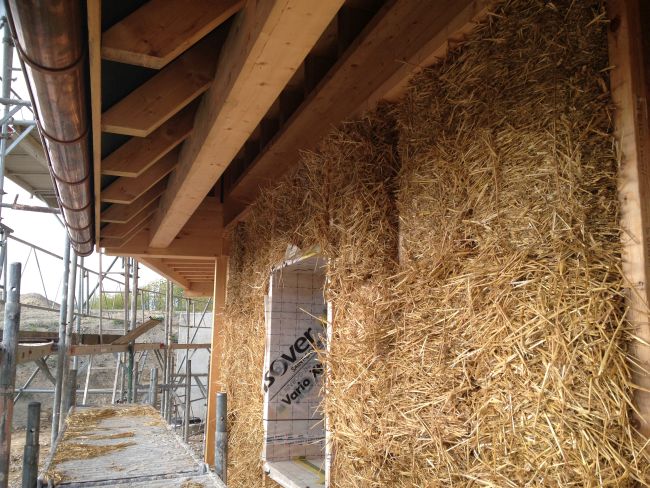
We then looked around the very impressive farm, with dozens of huge polytunnels and wide range of produce. The farm supplies the now-organic primary school among other things, a great example of what they call “short circuit”, shortening the distance between grower and consumer.
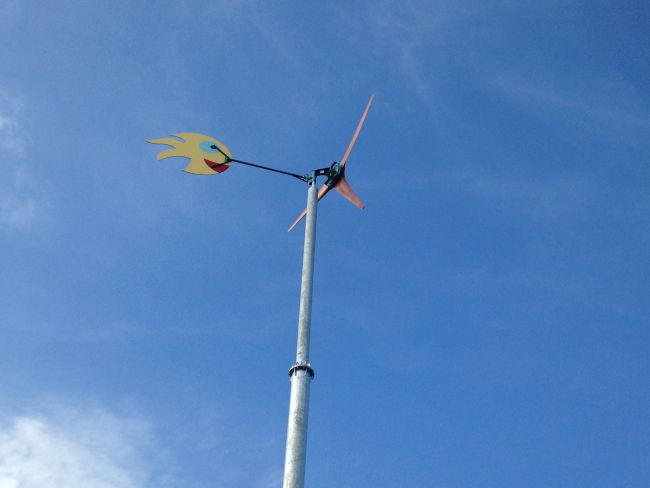
We then headed back to the centre of town for Inauguration Number Three. For what was called ‘La Semaine Solaire’ (‘Solar Week’), at the Mayor’s invitation, a Greenpeace group from Switzerland had been working with a group of teenagers from the local Lycée, mapping every roof in the town, analysing elevations, size and so on, concluding that if every roof that could take solar PV were to do so, they would meet 77% of the town’s energy needs.
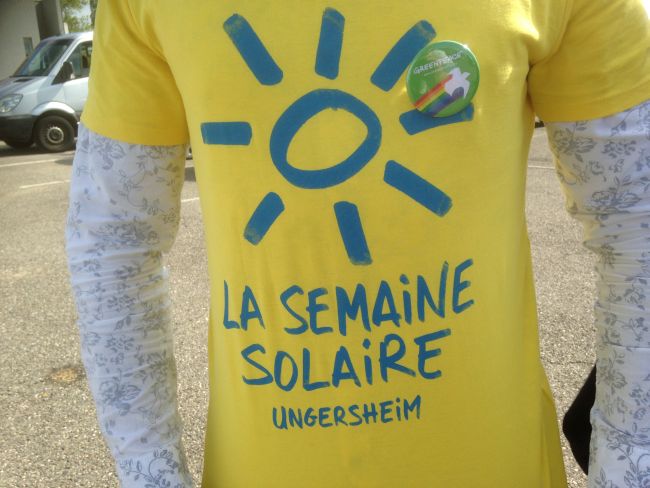
It was a project that had had a huge impact not just on the young people involved, but also on the Greenpeace activists. Most of their work has been around saying no to things, campaigning and resisting, and this shift into taking positive and practical steps was something that had touched them deeply.
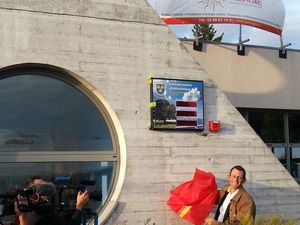
The local school was launching its new 40Kw rooftop solar PV installation, and it was the opportunity to also recognise the young people who had been part of the project, giving them each a certificate, before I formally unveiled the installation’s meter showing its output and generation. They also gave me one of their ‘La Semaine Solaire’ tshirts, on which they had written, “Pour Rob, on behalf of Lycée Théorore Deck, the first Lycée en Transition in France”.
After a short break, featuring local organic beer and a traditional kind of oompah folk band, I gave my evening presentation. Before I spoke, some students from the local primary school came on stage to announce that they were reimagining their school as a School in Transition, and shared with the audience what they were doing, which included recycling, growing food, and having someone in each class whose role it is to turn the lights off each day.

With the help of the wonderful Peter, who had been my translator all day, I gave an overview of Transition and why what is happening in Ungersheim is so important. So many people came, that the 20 minutes before I started saw a constant putting out of new chairs. We had a great Q&A session and then everyone milled around the many stalls of great local initiatives, and headed out again to the marquee for supper, wine and conversation.
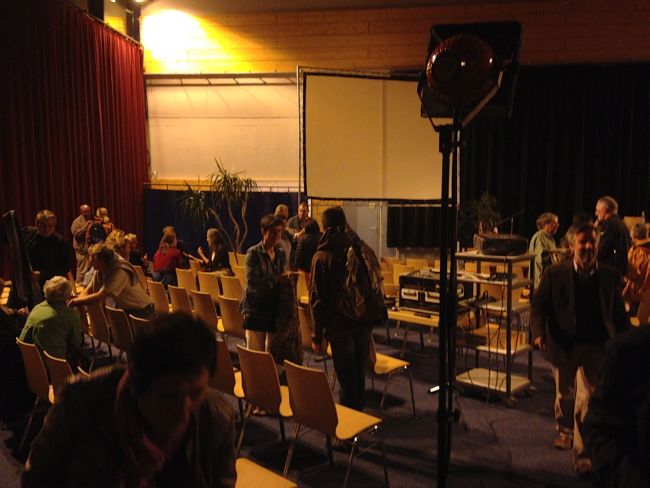
 One of the most powerful things about Transition I think and one of the reasons it has spread so far and wide, is the principle we borrowed from Open Space of “Let It Go Where It Wants To Go”. By trusting people, giving resources and tools away for free, with the only ask that Transition groups share their stories and experiences, a culture has been infused that trusts innovation. Like many areas of Transition, the edge between Transition and local government is just that, an edge. Can we say that Transition should never be initiated by a Mayor or local government? It clearly takes a pretty remarkable person to do it, but in Jean-Claude Mensch we have that. I’ve seen a few failed attempts in the past, but the proof of this particular pudding is in the eating.
One of the most powerful things about Transition I think and one of the reasons it has spread so far and wide, is the principle we borrowed from Open Space of “Let It Go Where It Wants To Go”. By trusting people, giving resources and tools away for free, with the only ask that Transition groups share their stories and experiences, a culture has been infused that trusts innovation. Like many areas of Transition, the edge between Transition and local government is just that, an edge. Can we say that Transition should never be initiated by a Mayor or local government? It clearly takes a pretty remarkable person to do it, but in Jean-Claude Mensch we have that. I’ve seen a few failed attempts in the past, but the proof of this particular pudding is in the eating.
What’s more important is that within the French context, Transition appears to be springing up all over the place. I was told that there are now 60 local currency schemes already in operation in France, with good coordination ensuring that they are all good neighbours to each other. The Transition mycelium is live and running. In this context, being able to point to Ungersheim, where the Mayor and the Comune are making so much amazing stuff happen is very powerful. The story of how the Mayor of Bristol takes his full salary in Bristol Pounds is a story I tell in all my talks, and it always generates a reaction of “wow, this stuff is stepping up and being recognised”. Ungersheim represents the next level of that story. It was an incredible thing to see, and I am very grateful to have been asked.
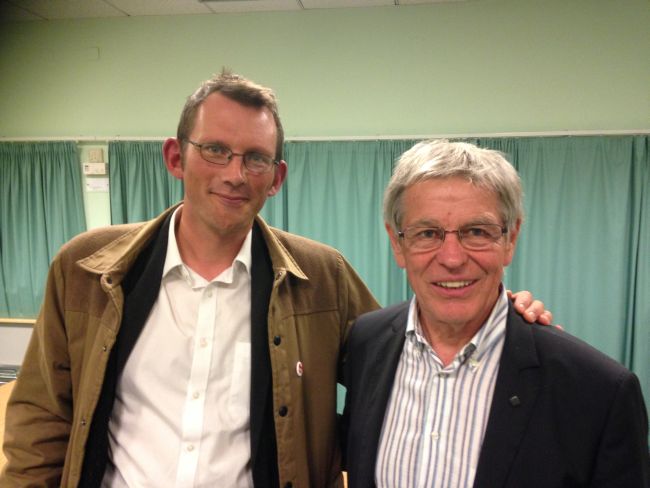
My thanks to Jean-Claude Mensch, to the Comune of Ungersheim, to my host Phillipe and my translator Peter, to Transition France, to Amber and to all the wonderful people I met there.
Read more»
28 Sep 2015
The 2015 Transition Network International Conference was the first we’d run since 2012, which was at Battersea Arts Centre in London. Our home was the very beautiful Seale Hayne, near Newton Abbot, and a remarkable few days it was too. While the amazing Transition Network team, supported this year by Dan Hurring of Another World Productions, do an amazing job of putting everything in place for the conference, something magical always happens when people arrive and the conference begins. This year was no exception.
If you want a quick overview of the event, check out the Storify presentation here. The conference began on Friday with our Skills Day, with a choice of offerings including a Transition Launch training, Become Your Own Developer, Conscious Collaboration, REconomy and others. This brought an early buzz to the venue while those coming for the main conference were still making their ways there.
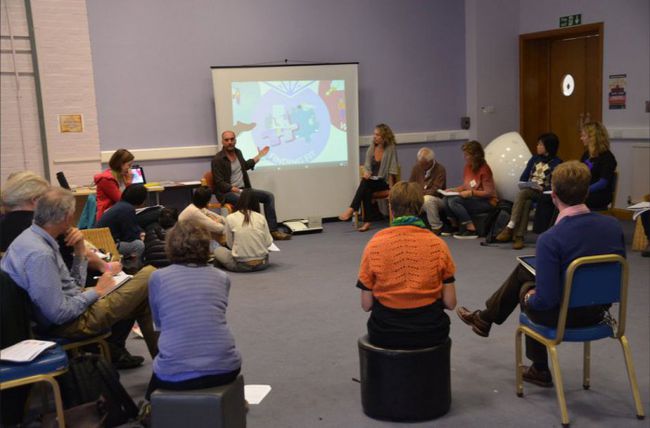
The conference itself kicked off at 6.30pm, with delegates being welcomed by local choir Glorious Chorus, first in the courtyard and then singing us all into the Great Hall. Hosted by Sophy Banks and Anna Maris, it featured a few short welcomes, including one from Juliet Davenport, CEO of Good Energy, the conference’s main sponsors, who told those gathered “we’re here to listen”, as well as from the Dame Hannah Rodgers Trust, our hosts at Seale Hayne.
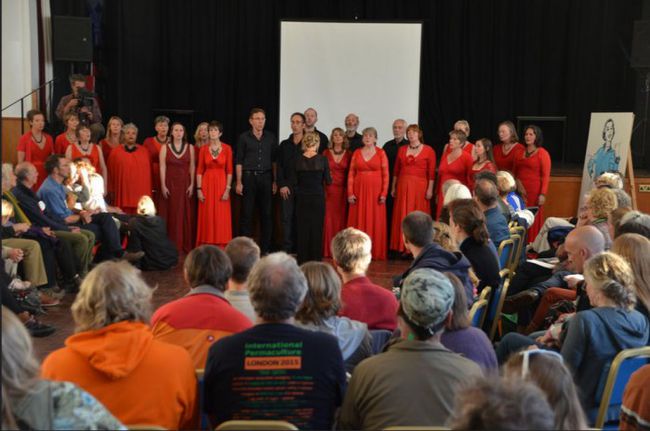
We then did our traditional mapping exercises, mapping the room from oldest to youngest, and then geographically in terms of where people had come from, and lastly the size of our settlement, and how long we had been doing Transition. People with roving mikes took soundings from different places in the room so we could all hear snippets of who we were to be spending the next few days with.
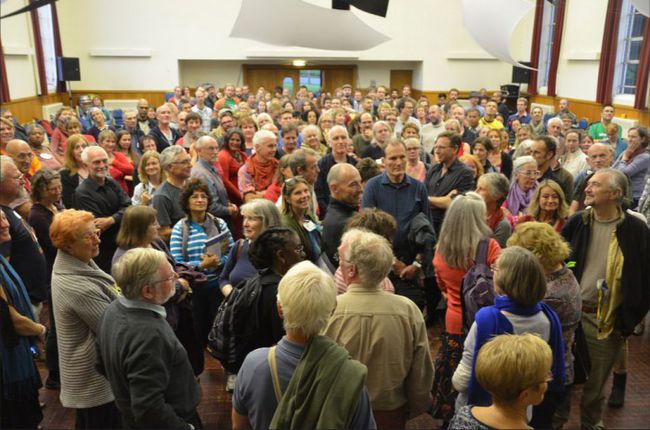
Anna from Columbia set the mood about right when she said, “I am so excited to be here … I have bubbles in my stomach!” The opening closed with Glorious Chorus, who sent people off out into the night, first to eat, and then possibly to the Bar, with a song. Saturday opened with sunshine.
For the first session, people made their way down to the Sports Hall. With the addition of people just coming for the Saturday, this was a very large group of people!
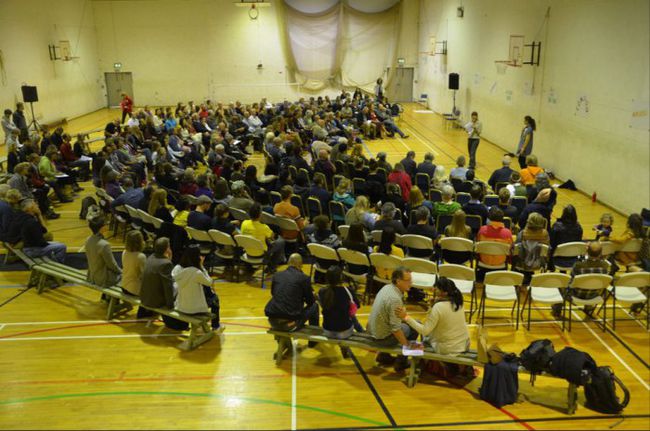
Juan del Rio from Spain and Josue Dusoulier from Belgium facilitated the activity. Working in groups, they were asked to write down what they were bringing to the conference, what they were looking for, and what they are celebrating. These were pinned up along the Hall’s long wall, arranged under each nationality.
We were then treated to the amazing site of many hundreds of chairs being carried back up to the main building by many hundreds of people.
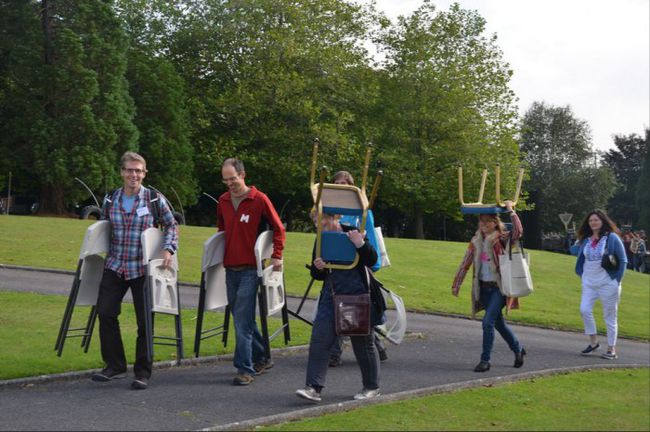
The first workshop session offered an embarrassment of riches. There were workshops on, among other things, the Transition Healthcheck, Caring Town Totnes, how does change happen, Indigenous Wisdom, conflict resolution, REconomy, Common Cause and social media, followed by lunch in the sunshine, which also featured the launch of Howard Johns’ new book , Energy Revolution.
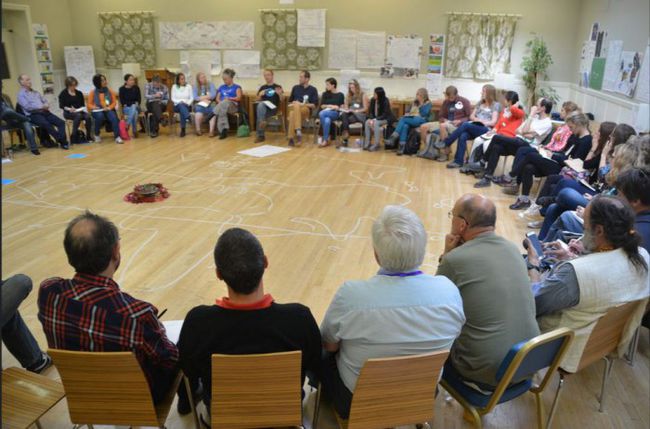
The afternoon began with another round of workshops, this time including Bike Maintenance, Flatpack Democracy, setting up a Local Entrepreneur Forum, Sociocracy 3.0, a Truth Mandala, Food Assemblies, and setting up a local currency. I co-presented one with Sarah McAdam on Telling the Transition Story, presenting the Transition Story project we have been working on for the past year. With so many great workshops on offer, choosing which to go to wasn’t easy for people!
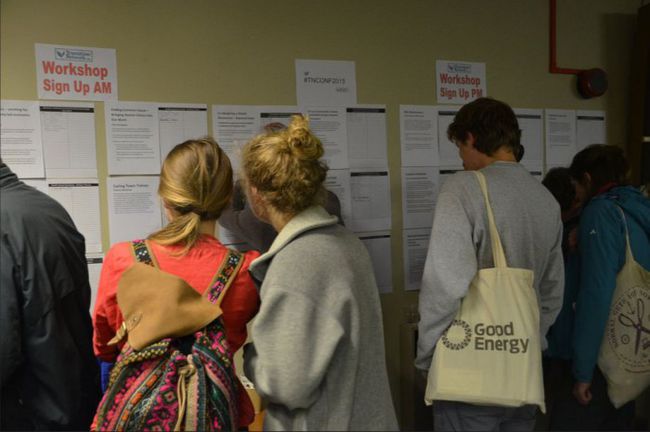
After the break, there was another, but more spacious, choice to be made. Some people headed off to sit on the grass in the sunshine, to have a sleep, or to play football. Some attended an amazing ritual, designed and facilitated by Sophy Banks called the ‘Requiem for the Industrial Growth Society’, which was widely celebrated as having been deeply moving and powerful.
Others went to the Transition Webcast, something we’ve never attempted before, but which went really well, potentially marking the beginning of Naresh Giangrande and Filipa Pimentel’s new careers as TV presenters. Move aside Jonathan Ross. Here is the video of the Webcast:
Highlights included the Australian Transition group who attended in their pyjamas (it was about 3am there) and Pella Thiel, watching from Sweden, who tweeted a photo of how she was combining watching the webcast with preparing apples for some exotic culinary purpose.
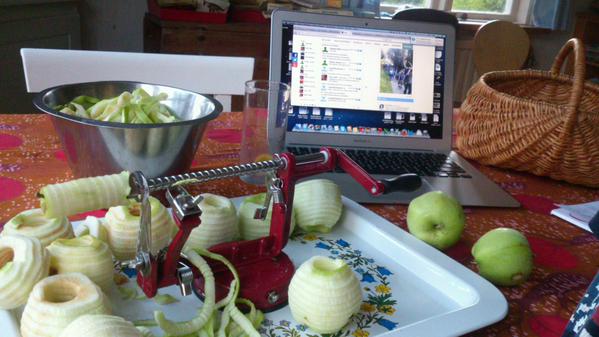
I presented a workshop that introduced the 21 Transition Stories for COP21 project I have been working on, which was very well received. Here is an audio recording of that.
This was followed by supper and then the evening cabaret! Hosted by poet performer Chris Paradox (and his amazing jacket) it featured the rather wonderful Bert Miller, a ‘Transition’s Got Talent’ spot and a disco. It also featured the opportunity to unwind, catch up with friends, and sample delicious local beers.
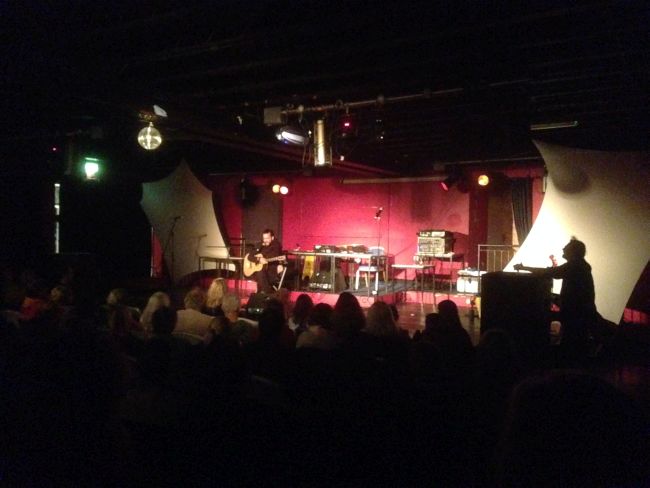
Sunday again opened into a glorious misty but sunny morning, and was Open Space Day. Many of you will have done Open Space, but it surely was not introduced in the way it was at this year’s conference! Presented like the briefing passengers get at the start of a plane flight, the practicalities of Open Space were outlined complete with flight attendants and announcements from the pilot.
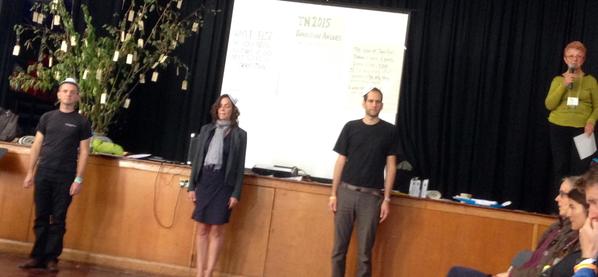
It must have worked, as everyone knew what to do and it all ran beautifully. Here is a short video capturing how the room self-organised from chaos to conversation:
There followed two sessions with a wide range of topics. You can see photos of all the write-ups from each session here. Open Space is always an amazing thing to see in practice, once again it worked a treat.
After lunch we had the closing session. Facilitated again by Sophy and Anna, it reviewed some of the key events of the previous day, and offered thanks to those who had made the event such a success, including “the Great British Weather”. We concluded with feedback from around the Hall as people shared how they had found the event.
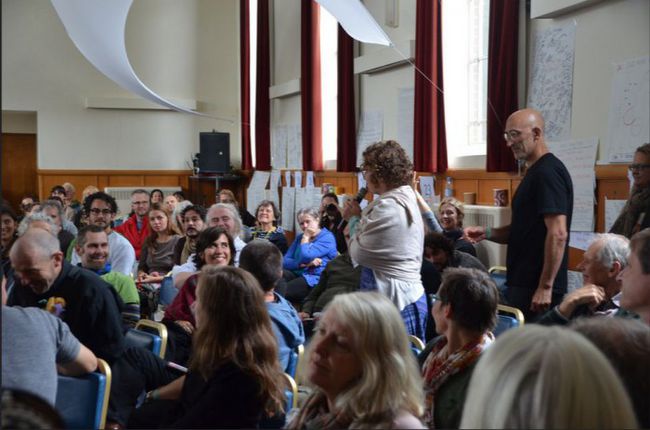
A few snippets of feedback that I noted down were:
“Transition Network has a long nose for sniffing out great things”.
“I’m a Transition Elder!”
“I think my list of Facebook friends just doubled”
“Thanks for restoring my faith in humanity”
“Solutions, solutions, solutions. I’ve not felt negative all weekend. Just positive”.
Everyone then filed out for a group photo in the sunshine, and that was that.
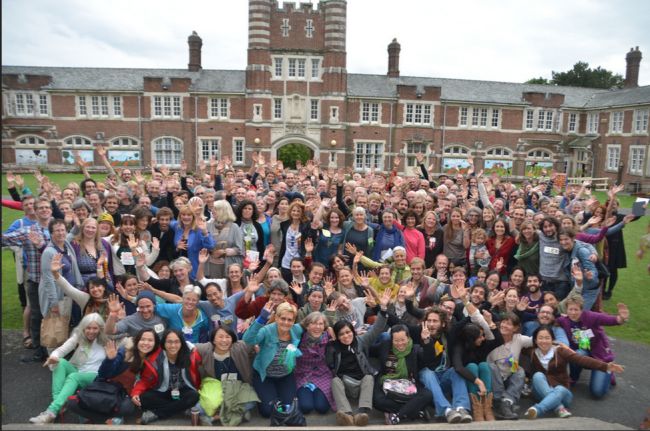
After many hugs, selfies, and exchanging of emails and phone numbers, people headed for home, apart from those who were staying on for the Hubs meeting the following day.
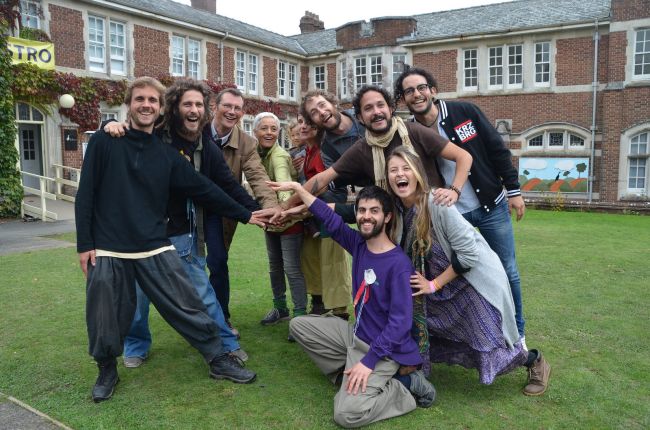
As one of just a handful of people who has been to every single Transition Network conference, what was different about this one? Firstly the international nature of it was clear, with that international feel not just represented in those attending, but also in the facilitation team. Secondly, the number of young people there was really heartening. The presence of Elders was also a feature of it, for the first time they organised Elders Breakfasts, and had a ‘Hearth’ spot where they could meet with other elders (how people chose to define themselves as ‘elders’, or not, was left up to them!)
It felt to me like the conference where the balance between Inner and Outer Transition was most seamless, most balanced, most integrated. Above all, it felt like such a privilege to be back among old and new friends, people doing such remarkable work in so many places around the world.
So, lastly, a few thanks. Thanks to everyone at Dame Hannah’s for their hospitality and welcome (special thanks to Carl Munson), to all our workshop presenters, to the technical team behind the Webcast who did such an amazing job and to everyone around the world who participated, to Bert Miller, Paradox and our Cabaret stars, to our Latin American self-entertaining singers and drummers, to our sponsors Good Energy, Triodos Bank and Naturesave, to Transition Newton Abbot and Transition Town Totnes for co-ordinating travel and couchsurfers, to the whole Transition Network team particularly Naresh Giangrande, and to Dan Hurring. It takes a community to put something like this on, and a community to bring it to life, and we are deeply grateful to you all.
Read more»
25 Sep 2015
It’s a few weeks since the Exeter Pound, which we last caught up with a few months ago, was launched. As we explore our theme of fairness, we asked Martyn Goss, one of the currency’s Directors, to share this thoughts as to how the scheme will make Exeter a fairer city:
“September 2015 saw the launch of a new community currency in Devon. From the start of the month the Exeter Pound has been tradable in just over one hundred independent businesses in and around the city. Exeter has therefore joined Bristol, Totnes and a few other places in Englandto introduce a local money system that has no value outside its own community, but which will be worth much within it.
Exonians are now able to spend their own notes (one, five, ten and twenty Exeter Pound denominations, plus a 15 EP special for the Rugby World Cup!) in registered shops, cafes, pubs, leisure venues, restaurants and elsewhere. Exeter Cathedral will accept the new money in its shop and cafeteria, as well as for admission charges. Exeter Chiefs premier rugby club is doing the same.
In the longer term, the Exeter Pound will encourage more local commercial activity, help prevent poverty and reduce environmental damage. There will be social, economic and ecological advantages, which will all be strengthened further when it goes digital in 2016.
In a global economy where smaller, family and independent businesses can really struggle to survive, a community currency provides a slightly more level playing field. As an advanced loyalty scheme, Exeter Pound offers people a chance to come alongside local companies and share a sense of stability and confidence with them. In the longer term this makes for a fairer and more sustainable society.
The Exeter Pound generates confidence and trust. We can ask the shops or cafes where we spend our money what they will do with it – ideally purchasing some of their supplies from other local firms. We cannot do this with sterling. It is too anonymous and unmanageable.
 There is no doubt that the Fairtrade movement has brought about a greater awareness of who benefits from purchasing power. My reducing the middle-takers (which is what the word ‘enterprise’ literally means) and developing more direct relationships between producer and consumer both can take advantage. My hope is that the Exeter Pound and its sister currencies will also have the same educational effect on the public. The kind of financial systems we have created direct the gains to those who are least vulnerable. Fair-trade and local money can change this and promote a just and sensitive economy where we value people and the environment more than quick monetary returns.
There is no doubt that the Fairtrade movement has brought about a greater awareness of who benefits from purchasing power. My reducing the middle-takers (which is what the word ‘enterprise’ literally means) and developing more direct relationships between producer and consumer both can take advantage. My hope is that the Exeter Pound and its sister currencies will also have the same educational effect on the public. The kind of financial systems we have created direct the gains to those who are least vulnerable. Fair-trade and local money can change this and promote a just and sensitive economy where we value people and the environment more than quick monetary returns.
The Exeter Pound is a symbol of imaginative hope and expresses a sense of fairness which the global money system does not. If I don’t like it, I could probably change a community currency. I certainly couldn’t change to Dollar or the Euro!
The deeper message of our new money is that local people can begin to make a positive impact on their city – in spite of the odds. The Exeter Pound effectively empowers local people and that is why it just and fair!
Read more»
17 Sep 2015
Richard Wilkinson is Emeritus Professor of Social Epidemiology at the University of Nottingham. He is the co-author, with Kate Pickett, of the seminal book ‘The Spirit Level’. Much of his work has focused on health inequalities and the effects of income inequality on population health. We started our conversation, given our theme this month, with the question of what, for him, is meant by the word “fairness”.
“It’s not a matter of defining it abstractly. For me, it’s looking to see what makes a difference in society, it’s an empirical question and our research has shown that large income differences between rich and poor in a society are damaging in all sorts of ways. There are a whole bunch of different ways: death rates tend to be higher, so life expectancy shortens, there seems to be more mental illness, more people in prison, higher homicide rates, poorer community life, lower levels of child wellbeing. A whole raft of things.
They have a common thread though. They are all problems that tend to be worse at the bottom end of the social ladder. It’s those kinds of problems that are worse in societies with bigger income differences between rich and poor.
The Pope recently said in his Encyclical, that economic growth is inconsistent with addressing the climate crisis. I wondered from both a fairness perspective and a climate, planetary boundaries perspective, can economic growth ever be fair?
I wouldn’t use the word ‘fair’ about it. If it uses more resources and leads to higher carbon emissions or indeed stops us reducing carbon emissions dramatically then obviously it’s very bad for the planet. We have to make perhaps 90% reductions in carbon emissions which would be very difficult with any economic growth. But of course many people will define economic growth in ways that don’t necessarily involve more resource use. So far we haven’t seen any carbon neutral economic growth.
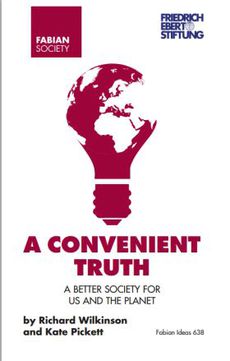 You’ve just published, or recently published a booklet called ‘A Convenient Truth’ in which you talk about and call for something called ‘economic democracy’. I wonder if you could tell us what you mean by that?
You’ve just published, or recently published a booklet called ‘A Convenient Truth’ in which you talk about and call for something called ‘economic democracy’. I wonder if you could tell us what you mean by that?
It comes up as a way of dealing with the very wide income differences in our societies. They are hugely much larger than they were for instance in the 1960s or 70s, and if you look at the 20th century you get high inequalities until around the 1930s and then they come tumbling down. Income differences go on reducing until probably some time in the late 1970s and then you get the modern widening of income differences again until our societies are as unequal now as they were in the 1920s.
Some of that is a matter of reducing top tax rates, they are hugely much lower than they used to be. But the most important component is that income differences before tax have widened dramatically. Incomes at the top have taken off and run away from the rest of us: the bonus culture, the huge incomes that CEOs and bankers and people in the financial sector have been paying themselves. What used to be true is that trade union strength was a counter to the unfettered greed of people at the top, but now unions are much weaker than they used to be and the way of recreating a democratic constraint on incomes at the top are all forms of economic democracy, by which I mean employee representatives on company boards, but also more employee owned companies, more co-operatives, things like that.
About half the member countries of the European Union have at least some legislation requiring employee representatives on company boards. That seems to make companies more efficient. It also reduces pay differences quite substantially. Britain needs that kind of legislation. We should strengthen it over time by demanding an increasing proportion of employee representatives on company boards, but we also need policies to grow the employee-owned sector and co-operatives: tax incentives, various other ways of trying to expand that sector.
Our long-term aim should be to deal with the anti-social behaviour of large, powerful, multi-national corporations which run rings round national governments and often make us all feel quite manipulated. The answer to that is democratisation. There are good studies that suggest that productivity is higher in more democratic companies and there are also indications that they perform better in environmental and ethical ways. Some people suggest that an employee buyout can turn a company from being a piece of property, the group of employees that comprise the company being owned by external shareholders, can turn that from being a piece of property into a community. It really changes working relationships when people are not working for external financial interest.
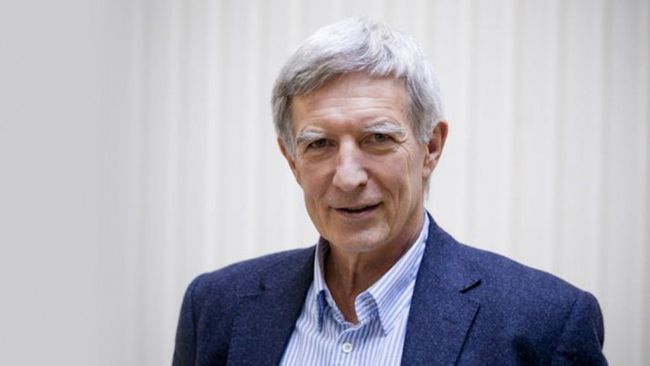
The Equality Trust (founded by Wilkinson along with Bill Kerry and The Spirit Level co-author Kate Pickett) started out quite similarly to Transition, taking a position of being very non-party political, very under the radar. But ‘The Convenient Truth’ is published with the Fabian Society. Does that represent a change in your approach?
The Equality Trust has recently become a charity and the director, I think, is very concerned to make sure he keeps absolutely to the letter the rules for being a charity. But my reason for publishing ‘A Convenient Truth’ with the Fabian Society is I thought that was the best way of getting it into the Labour Party. Fabians certainly used to be influential in the Labour Party, I suspect that’s less true now. Maybe under Corbyn it will be different.
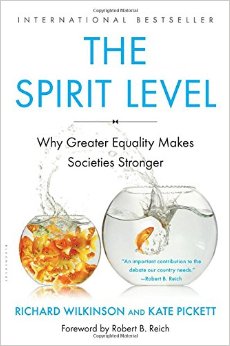 Speaking of Corbyn, one of the interesting things that’s been coming out of that is there are people in the Labour Party who have been saying that to really stress equality and fairness would make Labour unelectable, whereas he’s saying no, that’s where we need to go. I wonder if you have a sense of, if you had a government that were to adopt in full the findings of ‘The Spirit Level’ for example, would that make them more electable or less?
Speaking of Corbyn, one of the interesting things that’s been coming out of that is there are people in the Labour Party who have been saying that to really stress equality and fairness would make Labour unelectable, whereas he’s saying no, that’s where we need to go. I wonder if you have a sense of, if you had a government that were to adopt in full the findings of ‘The Spirit Level’ for example, would that make them more electable or less?
It’s very hard to predict, because we’re so influenced by the manipulative power of mass media. Some of it is owned by extremely wealthy individuals which is inconsistent with democracy. Part of any democratic constitution, I think, is that you need a well-informed public. Democracy only functions well with a well-informed public and that means having a more democratically owned and controlled media.
There is such a widespread disillusionment, anger, mistrust of politicians, more and more people not voting, saying that there’s no difference between the parties and increasing signs that people who step outside the party framework can do well. We had this in terms of mayors of London with Ken Livingstone and then Boris Johnson both seen as rather independent minded people. Clearly the following for Corbyn reflects an enthusiasm in sections of the population that haven’t been particularly interested in the Labour Party before.
There are so many things that someone like Corbyn could do. There was a suggestion in the paper that he might abolish the Party Whip which would mean, presumably, that MPs would start to say more what they believed in and became less puppets of their party views. I think people would be very attracted by that. If he handled Prime Minister’s Questions very differently it might also be very different. It might also be true that a lot of the things that he is standing for, polls suggest seem to have majority approval.
For instance, over 80% of the population seem to think that income differences are too large. That comes from the British Social Attitudes survey. He also wants to nationalise the railways. Opinion polls say there’s majority support for that. It depends very much on his willingness to speak out on these issues, really to defend them rather than be afraid of the media, afraid of the electorate, as much of the Labour Party’s leadership has been before.
In the European context we’ve seen Podemos, Syriza and other pro-equality parties doing well, but we’ve also seen the savaging of Greece by the EU and the ECB. If you want a fairer world, who should you vote for in an EU referendum?
There’s an enormous need for more international agreements. Not only to deal with climate change but also to deal with the tax havens and tax avoidance and also to deal with the enormous undemocratic power of multinationals, many of which are, in economic terms, bigger than very many countries’ national economies.
The EU, although it hasn’t often been backing the side of any of these issues that I would like, we do need those international co-operative measures to deal with these growing problems: climate change, tax avoidance and the problem of multi-nationals. I think we must be in bigger units and the problem is simply to get them to do more of the things that we need doing. We need to win them over to a more progressive agenda, if you like.
Is the message of ‘The Spirit Level’ the same in a contracting economy as it is in a growing economy?
Whichever we have and whichever phase of the business, we need small income differences. You were talking about the electability of someone like Corbyn earlier, but there is a big shift going on in world opinion. We had statements from the Pope, from Obama, from Ban Ki Moon, from Christine Lagarde, all talking about how inequality is the most important issue now in our societies, recognising how damaging it is. Even economists now at OECD and the World Bank recognising that it’s economically damaging as well.
Greater equality not only reduces issues like violence and strengthens community life, but it also is important in moving towards sustainability because one of the big drivers of consumerism which I think is perhaps the biggest obstacle to policies for reducing carbon emissions, is about status competition. The data is fairly clear now from research showing that in more unequal societies, those societies with bigger income differences, status matters more. We judge each other in those societies more by where we are in the job hierarchy and incomes and so on.
So we all get more worried about status and of course how we show what we’re worth is through our expenditure. In a way, people sometimes think of consumerism as a way of showing that you’re all-possessive, acquisitive, materialistic, but actually consumerism is a very alien form of social communication. If I wanted a bigger, better car, live in a smart part of town and wore clothes and so on with the right labels on, that’s an attempt to communicate my worth to other people. We can see in the data that those forces are stronger in more unequal societies.
You write in ‘A Convenient Truth’ that ‘we typically lived in societies with an extraordinary degree of equality.’ What went wrong?
Inequality starts to grow really from early agriculture. During the biggest part of human existence, when I say human existence I mean in our modern anatomical form with brains our current size, we lived in hunting and gathering societies which were extraordinarily equal, based on food sharing and gift exchange and so on. Not because people had a different psychology then, because any attempts at dominance and to be bossy or whatever was met by what anthropologists call ‘counter-dominant strategies’. So if you were anti-social, difficult, domineering, you would be teased, ostracised, whatever, to bring you into line. There’s a very nice book on that by Christopher Bohm called ‘Moral Origins’, well worth reading, about how those societies worked.
But although people know that agriculture coincides with or initiates the rise in inequality, there’s less agreement on what the link is and how it works. Something to do with more complicated and denser societies, denser populations. But there are other reasons as well. In a sense, agricultural production is no longer a communal activity as big game hunting was in hunting and gathering societies, so what is produced becomes a matter of individual endeavour, individual work. Of course, that’s remained true through the long history of agricultural development, so – the product is mine because it’s what I worked to grow. But in modern societies, production is a communal activity now. We all work co-operatively and all our contributions are necessary. We each produce for other people to consume, playing different roles in often very complicated productive processes. There are reasons to think that maybe economic development, industrialisation moving beyond agriculture may have changed some of the rationality of inequality, what underlies inequality.
Modern companies involve bringing together the skills of knowledgeable, highly trained people. It’s no longer a matter of an educated boss who knows what the company’s got to do and a lot of unskilled workers who are often kept in ignorance about that. The fact that modern production has that character means that you need more workplace democracy, and indeed how much control people have in the workplace seems to be one of the important determinants of workplace health.
 The focus that the Transition movement takes is starting with communities and starting at the bottom. I wonder if you had any thoughts on how Transition groups who are starting to develop new economies and start new social enterprises around food and energy and housing and all kinds of different things should be mindful of enshrining fairness and equality in from the outset.
The focus that the Transition movement takes is starting with communities and starting at the bottom. I wonder if you had any thoughts on how Transition groups who are starting to develop new economies and start new social enterprises around food and energy and housing and all kinds of different things should be mindful of enshrining fairness and equality in from the outset.
When local businesses are started it’s very important to try and start them along democratic lines, preferably as co-operatives. It’s also important to pay the Living Wage. The Living Wage is properly defined, not as the Chancellor recently defined it, and to try and keep income differences small. As I said earlier, the big rise in inequality has been runaway top incomes. Income differences in the biggest 350 or so American companies were about 1:30, 1:40 in roundabout 1980. They are now more like 300:1 or 400:1, i.e. they’re ten times as big as they used to be. Encouraging democracy in our economic activity, making sure that people on the bottom are paid adequately, and that people don’t have the power to take more than their share of incomes at the top.
It’s a while now since ‘The Spirit Level’ came out. I wonder how you regard the impact that it’s had over that time?
It’s hard to know. Clearly there has been enormous change to people’s attitudes to inequality. Our book would not have been so successful if it had come out before the financial crash and the financial crash led people to think more fundamentally about where our societies were going and where we wanted them to go. Whether we have made an important contribution to that growing concern with inequality or whether we have simply benefited from it is something we’ll never know. But we certainly know that some of the world leaders have read it from the things they’ve said, so it may well have been influential.
One of the ways in which it has been influential which is also relevant to local activity is in initiating the fairness commissions. In a number of big cities in Britain, perhaps as many as 20 of our major cities have started Fairness Commissions to try and recommend ways of reducing income differences locally. One thing they all agree on is the importance of paying the Living Wage and to reduce income differences of companies that supply the local authorities and most of those local authorities have committed themselves to paying the Living Wage. Probably tens of thousands of people are now paid a bit more than they would have been. I know that the initiative based in Islington for setting up those commissions was stimulated by ‘The Spirit Level’. I’ve spoken to them, I think almost all of them.
So we can’t really be sure what the scale of the influence is, but it’s part of a very welcome process of growing awareness.
It really is worth emphasising the connection between consumerism and inequality. That people in more unequal societies seem to work longer hours because money becomes even more important in how you show your worth, and people get into debt more: as income differences get larger, aspirational incomes grow. People feel they need more to keep up. You can see that quite clearly in the data. In a number of ways, more equal countries seem to do better in environmental terms. One of them is that because community life is stronger, people are more aware of the common good, if you like the good of humanity which is absolutely key to doing anything about the scale of the problem of climate change and carbon emissions.
One of the important effects of having closer community life in more equal societies and as a result people being more aware of the common good is that surveys of business leaders’ opinions show that in more equal countries business leaders rate national agreements on climate change as more important than business leaders in more unequal countries, where they just feel that that’s not their job, they have to look after themselves. Recycling is higher in more equal countries. So a range of things suggesting that more equal countries do better in environmental terms.
[Here is the full podcast of our conversation].
Read more»
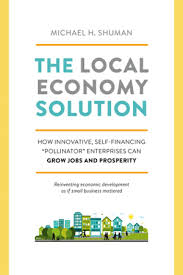


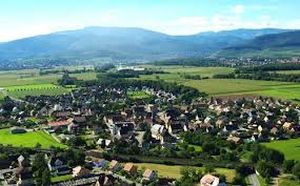


















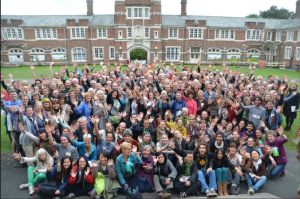













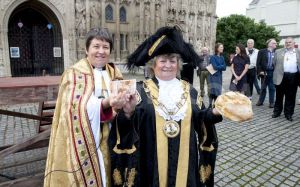
 There is no doubt that the Fairtrade movement has brought about a greater awareness of who benefits from purchasing power. My reducing the middle-takers (which is what the word ‘enterprise’ literally means) and developing more direct relationships between producer and consumer both can take advantage. My hope is that the Exeter Pound and its sister currencies will also have the same educational effect on the public. The kind of financial systems we have created direct the gains to those who are least vulnerable. Fair-trade and local money can change this and promote a just and sensitive economy where we value people and the environment more than quick monetary returns.
There is no doubt that the Fairtrade movement has brought about a greater awareness of who benefits from purchasing power. My reducing the middle-takers (which is what the word ‘enterprise’ literally means) and developing more direct relationships between producer and consumer both can take advantage. My hope is that the Exeter Pound and its sister currencies will also have the same educational effect on the public. The kind of financial systems we have created direct the gains to those who are least vulnerable. Fair-trade and local money can change this and promote a just and sensitive economy where we value people and the environment more than quick monetary returns. 


 Speaking of Corbyn, one of the interesting things that’s been coming out of that is there are people in the Labour Party who have been saying that to really stress equality and fairness would make Labour unelectable, whereas he’s saying no, that’s where we need to go. I wonder if you have a sense of, if you had a government that were to adopt in full the findings of ‘The Spirit Level’ for example, would that make them more electable or less?
Speaking of Corbyn, one of the interesting things that’s been coming out of that is there are people in the Labour Party who have been saying that to really stress equality and fairness would make Labour unelectable, whereas he’s saying no, that’s where we need to go. I wonder if you have a sense of, if you had a government that were to adopt in full the findings of ‘The Spirit Level’ for example, would that make them more electable or less?

